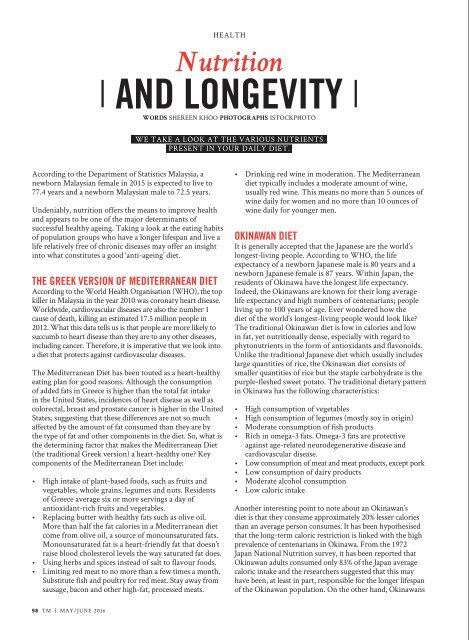Create successful ePaper yourself
Turn your PDF publications into a flip-book with our unique Google optimized e-Paper software.
HEALTH<br />
Nutrition<br />
AND LONGEVITY<br />
WORDS SHEREEN KHOO PHOTOGRAPHS ISTOCKPHOTO<br />
WE TAKE A LOOK AT THE VARIOUS NUTRIENTS<br />
PRESENT IN YOUR DAILY DIET.<br />
According to the Department of Statistics Malaysia, a<br />
newborn Malaysian female in 2015 is expected to live to<br />
77.4 years and a newborn Malaysian male to 72.5 years.<br />
Undeniably, nutrition offers the means to improve health<br />
and appears to be one of the major determinants of<br />
successful healthy ageing. Taking a look at the eating habits<br />
of population groups who have a longer lifespan and live a<br />
life relatively free of chronic diseases may offer an insight<br />
into what constitutes a good ‘anti-ageing’ diet.<br />
THE GREEK VERSION OF MEDITERRANEAN DIET<br />
According to the World Health Organisation (WHO), the top<br />
killer in Malaysia in the year 2010 was coronary heart disease.<br />
Worldwide, cardiovascular diseases are also the number 1<br />
cause of death, killing an estimated 17.5 million people in<br />
2012. What this data tells us is that people are more likely to<br />
succumb to heart disease than they are to any other diseases,<br />
including cancer. <strong>The</strong>refore, it is imperative that we look into<br />
a diet that protects against cardiovascular diseases.<br />
<strong>The</strong> Mediterranean Diet has been touted as a heart-healthy<br />
eating plan for good reasons. Although the consumption<br />
of added fats in Greece is higher than the total fat intake<br />
in the United States, incidences of heart disease as well as<br />
colorectal, breast and prostate cancer is higher in the United<br />
States, suggesting that these differences are not so much<br />
affected by the amount of fat consumed than they are by<br />
the type of fat and other components in the diet. So, what is<br />
the determining factor that makes the Mediterranean Diet<br />
(the traditional Greek version) a heart-healthy one? Key<br />
components of the Mediterranean Diet include:<br />
• High intake of plant-based foods, such as fruits and<br />
vegetables, whole grains, legumes and nuts. Residents<br />
of Greece average six or more servings a day of<br />
antioxidant-rich fruits and vegetables.<br />
• Replacing butter with healthy fats such as olive oil.<br />
More than half the fat calories in a Mediterranean diet<br />
come from olive oil, a source of monounsaturated fats.<br />
Monounsaturated fat is a heart-friendly fat that doesn’t<br />
raise blood cholesterol levels the way saturated fat does.<br />
• Using herbs and spices instead of salt to flavour foods.<br />
• Limiting red meat to no more than a few times a month.<br />
Substitute fish and poultry for red meat. Stay away from<br />
sausage, bacon and other high-fat, processed meats.<br />
• Drinking red wine in moderation. <strong>The</strong> Mediterranean<br />
diet typically includes a moderate amount of wine,<br />
usually red wine. This means no more than 5 ounces of<br />
wine daily for women and no more than 10 ounces of<br />
wine daily for younger men.<br />
OKINAWAN DIET<br />
It is generally accepted that the Japanese are the world’s<br />
longest-living people. According to WHO, the life<br />
expectancy of a newborn Japanese male is 80 years and a<br />
newborn Japanese female is 87 years. Within Japan, the<br />
residents of Okinawa have the longest life expectancy.<br />
Indeed, the Okinawans are known for their long average<br />
life expectancy and high numbers of centenarians; people<br />
living up to 100 years of age. Ever wondered how the<br />
diet of the world’s longest-living people would look like?<br />
<strong>The</strong> traditional Okinawan diet is low in calories and low<br />
in fat, yet nutritionally dense, especially with regard to<br />
phytonutrients in the form of antioxidants and flavonoids.<br />
Unlike the traditional Japanese diet which usually includes<br />
large quantities of rice, the Okinawan diet consists of<br />
smaller quantities of rice but the staple carbohydrate is the<br />
purple-fleshed sweet potato. <strong>The</strong> traditional dietary pattern<br />
in Okinawa has the following characteristics:<br />
• High consumption of vegetables<br />
• High consumption of legumes (mostly soy in origin)<br />
• Moderate consumption of fish products<br />
• Rich in omega-3 fats. Omega-3 fats are protective<br />
against age-related neurodegenerative disease and<br />
cardiovascular disease.<br />
• Low consumption of meat and meat products, except pork<br />
• Low consumption of dairy products<br />
• Moderate alcohol consumption<br />
• Low caloric intake<br />
Another interesting point to note about an Okinawan’s<br />
diet is that they consume approximately 20% lesser calories<br />
than an average person consumes. It has been hypothesised<br />
that the long-term caloric restriction is linked with the high<br />
prevalence of centenarians in Okinawa. From the 1972<br />
Japan National Nutrition survey, it has been reported that<br />
Okinawan adults consumed only 83% of the Japan average<br />
caloric intake and the researchers suggested that this may<br />
have been, at least in part, responsible for the longer lifespan<br />
of the Okinawan population. On the other hand, Okinawans<br />
98 TM | MAY/JUNE <strong>2016</strong>


















